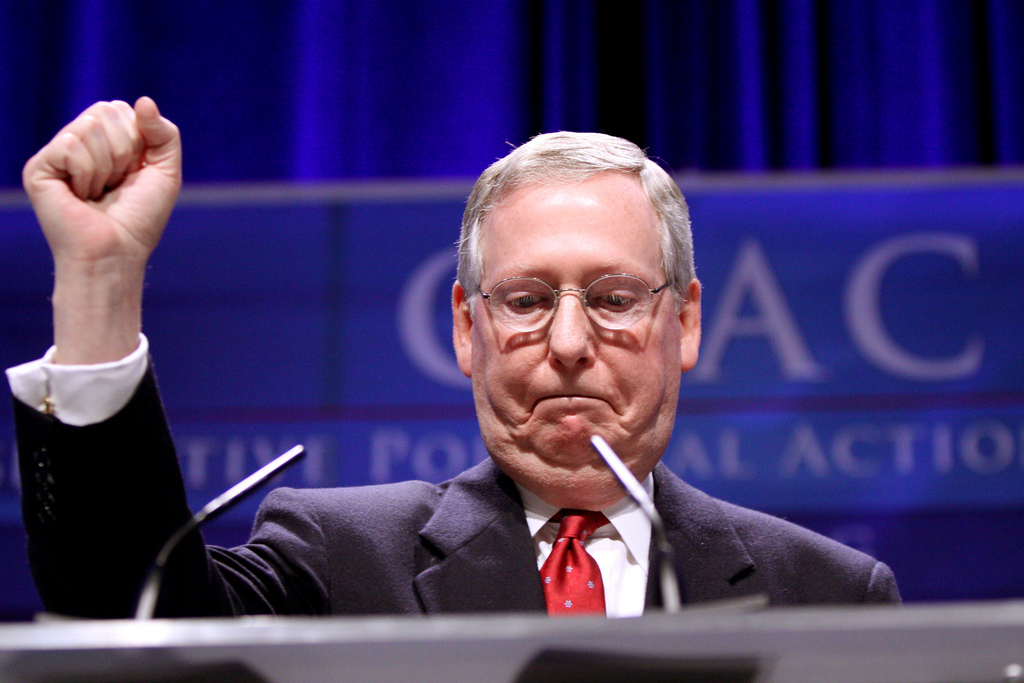Back in early 2016, Jon Favreau wrote that “Every election is a competition between two stories about America.” That struck me as fundamentally true. He went on to accurately articulate the story about American that Donald Trump was telling, which hasn’t really changed since back then.
He is a celebrity strongman who will single-handedly save the country from an establishment that is too weak, stupid, corrupt, and politically correct to let us blame the real source of our problems—Muslims and Mexicans and Black Lives Matter protesters; the media, business, and political elites from both parties.
I was reminded of that when I watched this video of a discussion Judy Woodruff had with David Brooks and Ezra Klein. At about the 4:00 minute mark, Brooks articulates the problem Mitch McConnell and the so-called “establishment Republicans” face right now.

Here is Brooks:
The thing I think we learned this week is that Roy Moore and Steve Bannon, what we will call the nationalists, they have a story to tell. They have a story about the country and why it’s going astray. They have a story about what is wrong with Washington and the swamp and why it needs to be drained.
The regular Republicans, the Mitch McConnell Republicans, have no story. And they thought they could hold off the nationalists with money, and with logistics and with party organization.
And I think one of the things we have learned is they can’t do that, that if you want to hold off Steve Bannon, you actually have to have an argument, you have to have a story about why his kind of Republican is the wrong kind.
In that answer, Brooks hits on a lot of the Republicans themes I’ve been identifying over the last few years. First of all, the Republican story was decimated during the George W. Bush presidency. Both his implementation of their economic and foreign policy were a disaster.
In response, the GOP didn’t re-think their story. Instead, under the leadership of Mitch McConnell, they abandoned any attempt to do so in favor of obstructing whatever the Democrats tried to do. The “party of no” ensured that government wouldn’t work. In order to make that fly, they stoked the fear-mongering of the racist wing of their party against this country’s first African American president. Donald Trump simply played along with his birther lies, while their 2012 nominee, Mitt Romney, welcomed his endorsement.
When Trump came along to ride that wave to the presidency, he simply appropriated the fear-mongering story and turned it against them, leaving them with nothing. When Brooks says that Steve Bannon is telling a nationalist story, that is what he is referring to. It is what has been called the politics of resentment, the appeal to nostalgia voters and the confederate insurgency. As Favreau articulated above, that is the story Trump ran on and, while he chose the wrong side in the Alabama run-off by endorsing Strange, it was Bannon and Moore who took over the story.
Brooks also noted that McConnell thought he could battle the “nationalist” story with money, logistics and party organization. Of course he did. As the one person who has done more than anyone else to promote dark money in politics, that is naturally the weapon of choice for McConnell. He will likely be the last one to recognize that, as Eliza Newlin Carney recently wrote, big money has actually become a problem for the GOP.
As the champions of campaign-finance deregulation and unrestricted corporate spending, Republicans on Capitol Hill are now more in tune with their billionaire conservative donors than with the average GOP voters who rallied behind Trump. This shows up in both the shelved GOP health-care bill and in the pending Republican tax overhaul, which both cater to ultra-wealthy donors while ignoring that most Republicans actually support Medicaid and do not favor cutting taxes for the rich.
I think its even more insidious than that. As I’ve written previously, the RNC became a wholly-owned subsidiary of the Koch brothers in terms of both funding and operations. McConnell has always been a blank slate whose rise in the Republican ranks had more to do with his ability to bring in money as well as maneuver the power games that are played in Washington. It is no surprise that he has led the so-called “establishment Republicans” to a place where they have no story (i.e., agenda) and assumed that big money would be able to rescue them.
Meanwhile, Bannon has his nativist story and he will use it against every establishment Republican he supports in a primary battle in 2018. In many ways, he will tie them to McConnell in much the same way I suggested that Democrats should. Having learned his lesson in the Alabama race, it seems a pretty safe bet to assume that Trump will join that bandwagon and attempt to ride it all the way to 2020.
Of course, none of this has anything to do with the reality of specific policies or governing that Martin discussed last week. McConnell toyed with the Republican base, gave a platform to the likes of Trump/Bannon and is now locked in a power struggle with them for control of the party.
It all goes back to that fateful dinner in 2009 on the night of Barack Obama’s inauguration when party leadership decided to abandon any attempt to put together an agenda and simply decided to obstruct. In doing so, they ensured that the only remaining story in the Republican wheelhouse was the one that appealed to nativist insurgents. Any GOP candidate who isn’t interested in telling that story is facing the same thing as Gov. John Kasich right now, “If the party can’t be fixed … I’m not going to be able to support the party. Period.” All of the money McConnell can raise isn’t going to resolve that one.



